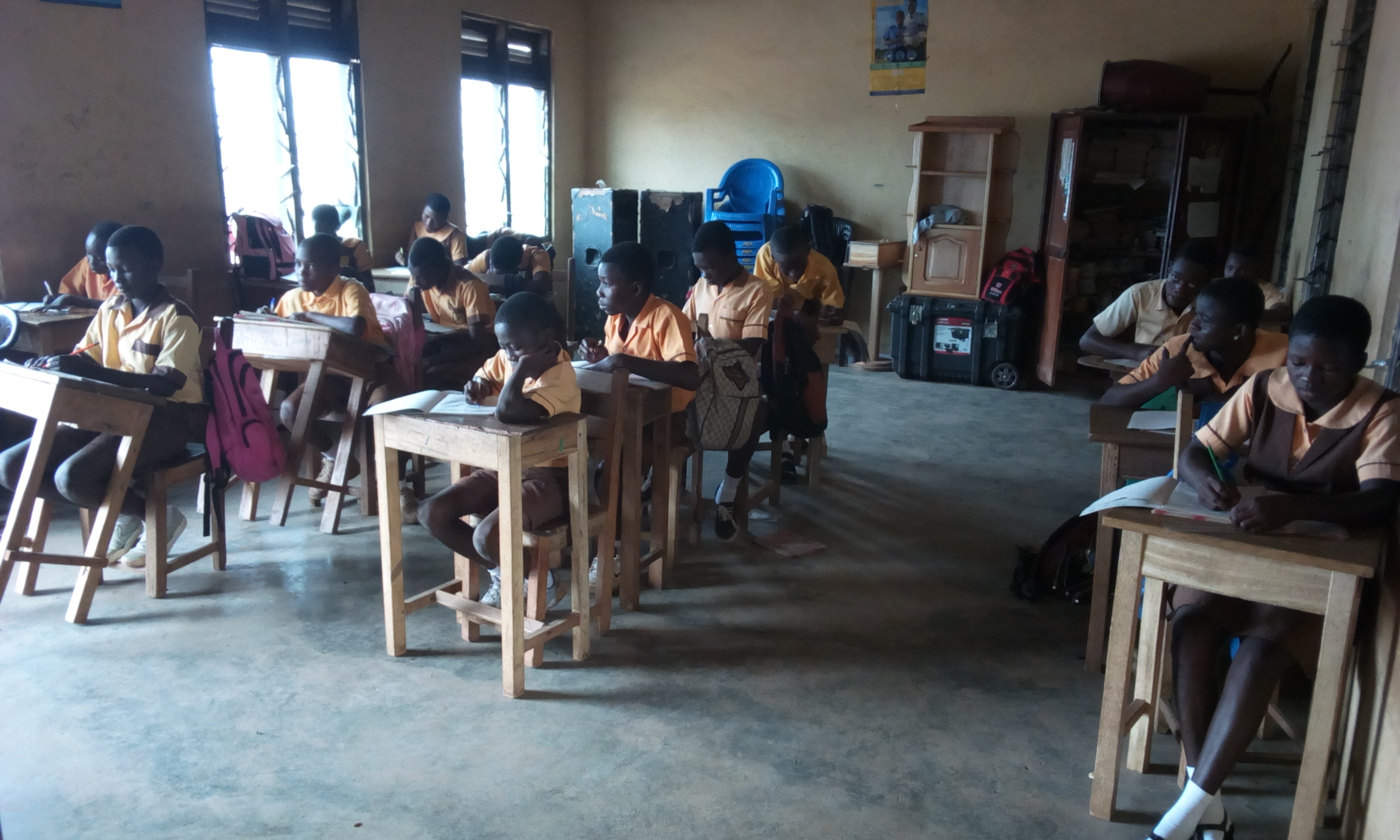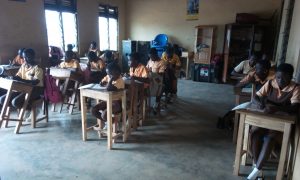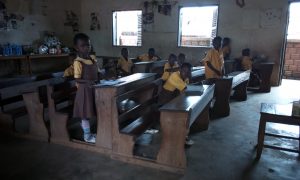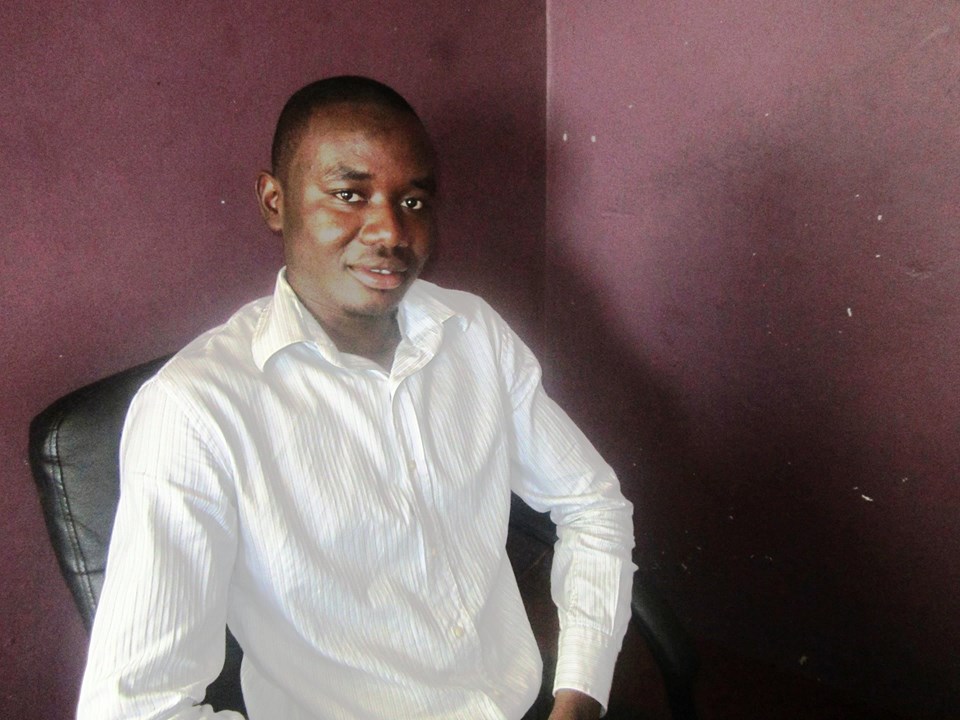Churches In Classroom: Threat To Academic Performance In Government Basic Schools

|
Getting your Trinity Audio player ready...
|

A News Feature by Christopher Tetteh, Sunyani.
Commercial activities of some “one-man” church services held in the classrooms of government basic schools in the Sunyani Municipality are “behind the scene dragging back” government and other stakeholders quest to strengthen the entire Ghana educational system.
It is part of government’s core priorities, to upgrade schools from the basic level to uplift standards in the Free SHS programme, hence, fixing all odds to ensuring equitable and access to quality education for every Ghanaian child.
The introduction and improvement of the school feeding program from the basic levels, provision of free teaching and learning materials, as well as furniture and infrastructural development from previous governments, were interventions to make schooling attractive to children from the early stage of their life.
Other interventions include the deploying of graduates on the NABCO scheme to assist in the basic schools and many others to help bring better students from the basic level into the free SHS and help give the country quality education.
Investigations conducted in some selected basic schools in Sunyani revealed that activities of some one-man churches in the Municipality were gradually pulling back the legs of government and the Ghana Education Service (GES) by causing heightening pitiable academic performance of pupils’ of the government basic schools.
Schools visited were the Sunyani Municipal Assembly (M/A) basic schools, Nyamaa basic schools, St James basic school, St. Patrick basic school, Ghana Muslims Mission school and Boahenkorkor Presbyterian A&B basic schools.

Distressfully challenges
Speaking to some Headteachers, classroom teachers who pleaded anonymity and some pupils’ of the schools surveyed, they indicate that “the activities of churches had broken the entire dual desk provided by the government to stock the classrooms, leaving few others skeletonized to tear the uniforms of the pupil”.
The continued dragging in and dragging out of the dual desks so they can have their church services is causing destructions to all the furniture in the schools, they complained.
“Utilities and other physical belongings of the schools were always being mishandled by the churches, at the same time, teaching and learning materials designed and fixed on the walls of the classrooms to help the lower primary pupil were all wiped off by the activities of the churches”.
At the M/A basic schools, all the classrooms, from Primary One to Six were completely empty; there were no dual desks with the exception of the Kindergarten (KG) class having only five desks for the children.
A headmistress said with much worries that “many of the children who don’t want to be in the house had no option than to squat when classes are in full section”.
“Many were the students whose parents could not afford to get them personal table and chairs, so they were managing themselves to be roaming in the schools”, another teacher emphasized.
Others try to stand during classes’ hours to learn every day because they don’t have permanent seating places, a class one teacher in one of the schools also revealed, but pleaded anonymity.
In one class six (B) visited, there were 17 pupils in total but eight (8) out of the number have no table and chairs so the only option for them to read and write was by perching beside friends with furniture and that was dragging back their academic performance.
One class prefect bitterly lamented that they always become stranded when they come to school and calls on authorities to immediately come to the aid of the school.
According to heads of the schools visited, “the churches pay only Ghc 20 per month, totalling Ghc 240 to the school per annum.
This clearly indicated that those churches are doing more damages and harm to the schools’ progress than good”.
As much as the prevalence of ‘classroom churching’ is escalating, government basic school children in other districts in the country, particularly the rural communities would continue to suffer this canker if not checked as a matter of urgent.
It is observed that Schools under the watch of the Sunyani Municipal assembly were lackadaisically managed, causing such nuisance to the pupil, hence, needed strict internal bye-laws to deal with such situation.
They are rather causing financial loss to the government and other financiers.
Academic Effects
A Headmistress lamented that “in my records since I have been in this school, the situation was frequently causing absenteeism and drastically reducing enrolments every term”, meanwhile, the contributions of such perpetrators to the school were unsatisfactory.
“It was affecting teaching and learning and always decreasing academic performance because the pupils` were not motivated being in the school”, she added.
She stressed that “this has become a challenge and havoc gradually threatening the progress of these government basic schools, because the pupil, from Primary One to six were in desperate need of dual desk to give them comfortable seating places to learn”.
Because most of them do not have tables and chairs, they don’t have permanent seating place in the class, hence they are always roaming and increasing absenteeism, the Headmistress stated.
Compared to some of the Mission Schools in the Sunyani city
At the same time, the Mission schools in the Municipality, particularly St James basic and St Patrick basic schools (all with A&B) under the watch of the Roman Catholic has all the classrooms filled with furniture from Kindergarten (KG) to upper Primary.
Again, Boahenkorkor Presbyterian basic schools also A&B, from Kindergarten (KG) to upper Primary under the watch of the Presbyterian Church in the same Municipality was also exempted because of proper management of their school properties.
The pupils were all seated in twos on each desk enjoying teaching as at the time of the visit.
The Sustainable Development Goal 4
Education, it said, “is explicitly formulated as a stand-alone goal”.
It is not only an integral part of sustainable development but also a key enabler for the holistic growth of both the person and a country.
Education is both a goal in itself and a means for attaining all the other SDGs, thus, education represents an essential strategy in the pursuit of the SDGs.
The Sustainable Development Goal 4 talks about the provision of inclusive learning environments for all, regardless of gender, disability and family background- (whether rich or poor).
This emphasized the need to provide access to early childhood development through quality education from the early stage of the child by ensuring inclusive and equitable quality education and promote lifelong learning opportunities for all.
It said Youth +Education =Transformation. But I think is not just education but rather, Proper Education to facilitate holistic national development.
Conclusion
With this observation, the furniture scarcity canker in government basic schools in the country could no doubt be attributed to the activities of these one-man churches in classrooms.
The situation, if not attended to with immediate actions for better solutions would hinder the SDGs achievement.
My humble appeal to the government, Ministry of education, the Ghana Education Service (GES) and the Metropolitan, Municipal and District Assemblies is to as a matter of importance institute a bye-Law to strictly check the mismanagement of the schools’ properties by the churches.
This is because; the cost of purchasing ‘one dual desk’ is at least between GHC 155 to 180 according to three different carpenters in the Municipality.
The churches or any other institution must be responsible and pay for any form of damage caused to any school property.





